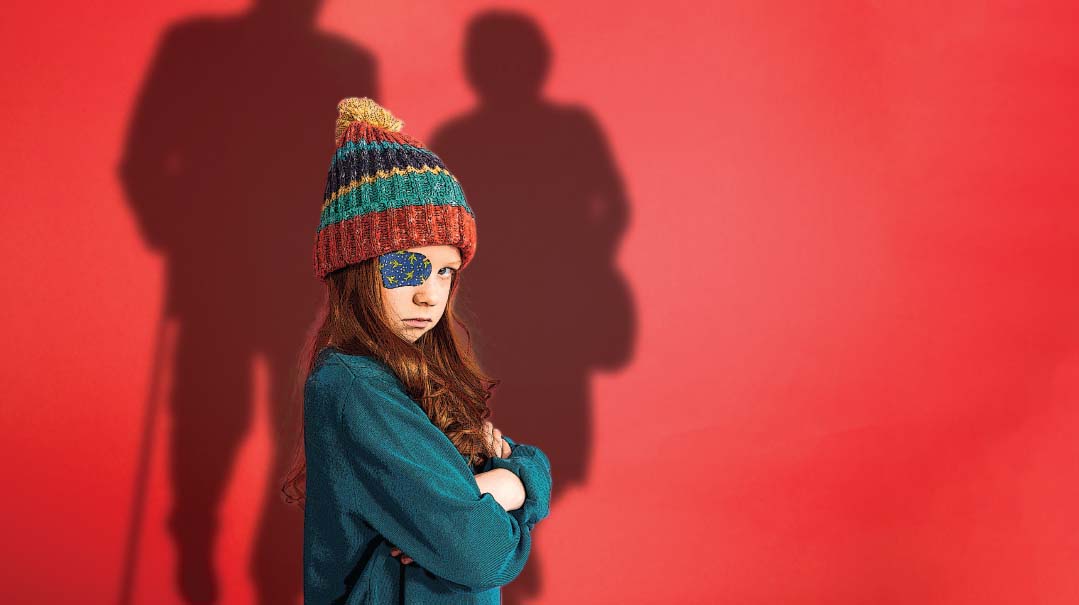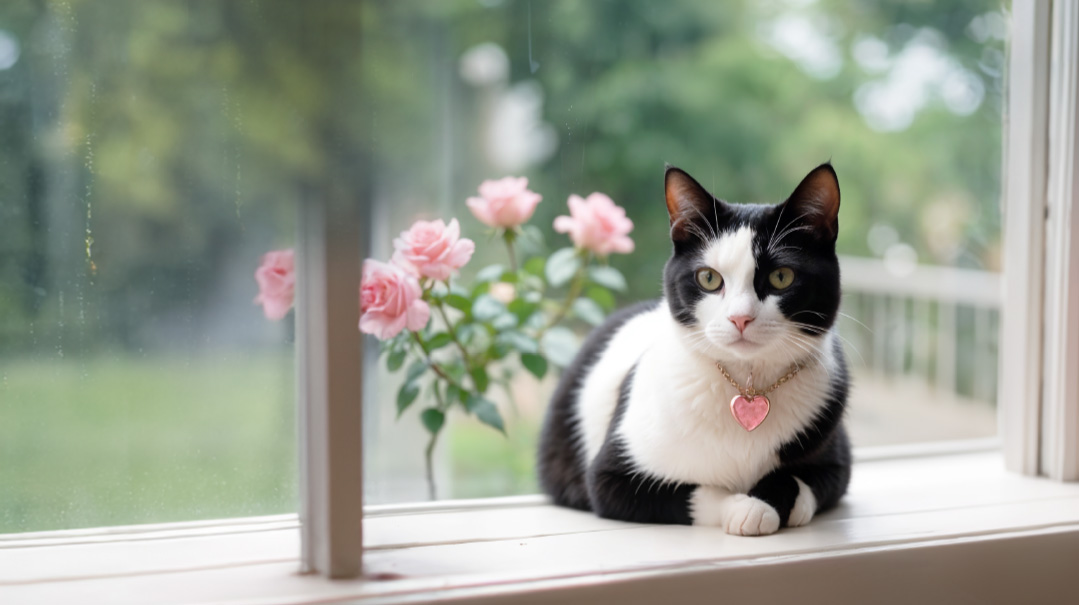What Meets the Eye

“I hate both of you, I hate these stupid eye patches, I hate that I ever met you!”

“I met someone special today.”
There was a chuckle in his voice; Sylvia could hear it. She felt her tension melt, glad that Sol was home, in a good mood — not a small thing. She hoped that meant his excursion alone had gone well.
“Is that so?” She listened as Sol closed the door, shuffled over to the table where she was cutting vegetables for dinner. One hand gripped the cylinder of the cool carrot, the other held the squat peeler. With her thumb, she determined which portions were unpeeled, which still needed work.
Sol stood to her right, so she turned her body toward him so he could see her face.
“She’s a redhead.”
“Hmm...” Sylvia knew in theory what that color was, but could not imagine the potential allure. She stayed silent, listening to his monologue, even though every fiber was shouting to cut in, to confirm if he had been safe.
“She’s six years old, and a real handful, so full of life. She reminds me of you, actually.”
At this, Sylvia had to laugh. Sweet.
“So who’s this girl?”
“She’s actually my cousin Dave’s granddaughter. So that makes her — what, my first cousin twice removed? Yaffa’s daughter, you know, the one from the city. They’re here for the summer, I guess to get away a bit.”
“Nice for them.”
“Yeah, but I don’t know how nice it is for Tammi — that’s the kid. Honestly, she seems pretty bored with both her parents working from home. Only child…”
Sylvia clucked her tongue in empathy; loneliness was an all-too familiar visitor. “Hasn’t made friends here just yet?”
“Doesn’t seem so. That’s actually how we met, through a shadchan you might say... or a team of them. The usual crew was picking on her today — you know how it goes — then stopped to shift gears as soon as they saw me approach.”
“Oh, Sol.” At this, she turned her head back down, shifting her full attention to the remaining carrots. She knew, she knew, it hadn’t been a good idea to let Sol go out alone. This was exactly the problem; she knew all too well which group he was referring to. It was the same one that always teased Sol mercilessly for his hunchback.
At least it wasn’t the rock-throwing of months past; the school had been wise enough to put an immediate stop to that.
But the taunts... Sylvia often knew when Sol would be entering the front door based on the names and cat-calls she heard from outside. Those continued mercilessly.
“Nu, nu.” Again, his characteristic chuckle. “Don’t go busting my fun, Sylvia. I don’t need a chaperone.”
Sol is joking, but he’s also not.
Sylvia knows she should let it go, but she also can’t.
They’ve had this conversation so many times before, Sylvia can hear the lines as if they're reading from a script.
Sylvia just sighs, picks up another carrot.
“So tell me more about Tammi.”
Later that day, they’re walking down the block, together — Sylvia had her way. The silence emanating from Sol is clear proof of how hard he’s taking it.
Sol claimed they were just looking for fun, and rousing up an old, disabled man was entertainment. He wasn’t scared of their taunts. She understood that the neighborhood boys were just bored. But boredom had the potential to morph those taunts into something larger, something physical.
She couldn’t, wouldn’t, allow Sol to be abused. Even if it stung that his wife had to be the one to provide protection. And how ironic that her more severe disability was what provided him with a much-needed shield.
Suddenly Sylvia heard her husband’s shuffle stop short, his supporting arm causing her to misstep.
“Hey, there she is! Tammi! Hey, Tammi!”
With Tammi’s appearance, Sylvia’s mood picked up. Despite Sol’s misgivings, she was glad she’d insisted on accompanying him; now she’d have the chance to meet Yaffa’s daughter.
First, she heard the steady, soft footfalls of skipping, then gentle panting.
“Cousin Sol!” There was Tammi’s voice of exuberance, her clear joy. Sol had been right; he always was a good judge of character. There was something unique, uninhibited, about this girl.
“Hiya there, Tammi. I’m glad we bumped into you. I was hoping to introduce you to a special person. This is my wife, Sylvia.”
Sylvia heard the rustle of arm against cloth, felt the presence of Tammi’s hand before her own. She responded in kind, grasping the slightly sweaty, surprisingly strong grasp of small fingers.
“Do you wanna feel my face?”
Sylvia startled. Sol must have mentioned to Tammi that this is how Sylvia learned what others looked like.
“Only if you’re comfortable…”
“Yeah!” Sylvia leaned down towards the upturned face, eager and willing and vulnerable as day itself.
Her fingers glided across Tammi’s peaks and valleys; the pert nose, the deep dimples, the frizzy fly-away hairs surrounding her head like a halo. Her hand paused only momentarily on the eye patch; it took a moment for Sylvia to figure out what the fabric over Tammi’s left eye was.
“Thank you, dear. You’re beautiful.”
She could sense the physical response to the compliment.
“It’s a pleasure to meet you, Tammi.”
“And you, Mrs…” Sylvia could almost imagine Tammi executing a curtsy.
“Just Mrs. Sylvia is fine.” She found it impossible not to like this dancing elf.
It wasn’t until later that week that Sylvia asked Sol about the eye patch. They’d bumped into Tammi a few times; Sol had acceded to Sylvia’s request, and all their walks were taken together. And each time they saw Tammi, she was bursting with energy, conversation, effervescence. There was new glitter in their life, and she seemed happy to have their company.
“Hey, I’ve been meaning to ask you, how’s Tammi’s eye?”
Sol seemed to pause longer than usual before his response.
“She’s got a weak right eye, the patch on the left is meant to strengthen it.”
“Hmm.” Sylvia continued her crocheting, her fingers moving steadily, steadily. Insert hook, front to back, yarn over. Pull up loop, yarn over.
“You know your yarn is still that pastel purple I hate, right?”
“Yes, yes.” Sylvia grinned. The woman in the store had assured her the color was beautiful. Sylvia had to trust her on that; she was sold on the silkiness of this alpaca wool. The yarn flowed over her fingers like water, and in the small store, Sylvia had delighted in that small pleasure. Sol claimed not to like the color, but it was always hard to tell with him if he was just getting a kick out of busting her chops.
“What is it about weak eyes that we’ve got a weakness for?” Sylvia chortled at her own joke; Sol just responded with a snort.
It was at the drugstore when they discovered the perfect present for Tammi. Sol bounded over, excited as a young pup.
“Look!” he exclaimed, then laughed at himself. “I need to describe these to you!”
Sylvia reached out to feel what was in his hands. Small plastic bumps…
“Large gauze band-aids?” She ventured a guess, underwhelmed.
His laugh gurgled. “Sorta. They’re eye patches! But colorful and lovely, with pictures and butterflies… Perfect to replace those bland ones Tammi’s mother insists on buying. These cardinals look neon…”
His excitement was infectious.
They tracked Tammi down to present her with the eye patches. Sylvia delighted at her energy, heard the immediate rip, the erratic static of plastic tearing, the rustle of wax paper.
It was then that Tammi shyly mentioned she wanted to show them something. Sol later told her how Tammi had furtively looked around, to make certain there was no-one else in sight. Then she withdrew from her knapsack a stuffed, worn-out something; even for Sol, it was difficult to discern what the girl was holding.
“This,” she said, in a ringmaster stage whisper, “is Floppy.” With reverence and care, she placed it gingerly into Sylvia’s hands. Sylvia stroked the worn fur, the long ears, the one remaining plastic eye.
“He’s beautiful,” Sylvia said authoritatively, honestly. “Floppy. I love him already.”
Sylvia couldn’t have predicted the fall-out. It happened so suddenly, so shockingly, that it felt like a physical assault.
First, she heard the footfalls: strong, determined, harsh.
She was sitting on her porch in a favorite rocking chair, crochet needle in hand; she dithered, uncertain if she should run inside to call for Sol’s help. Who knew if this was someone coming towards her?
But then she heard the voice crack like a whip: “Where’s Mr. Sol?”
The familiarity was there, but the usual sweetness was layered in a chill she could sense in her bones.
“Tammi, honey, what’s wrong? What happened?”
The only reply was the hiccup of tears, a muffled gasp.
“I need to talk to Mr. Sol, now.” Her voice was getting louder, angrier, and Sylvia put down her project. She lifted herself to call for Sol, but before she was standing fully, she heard the screen door creak open on its hinges.
“I hate you!!”
The strength of the words propelled Sylvia backwards into her seat.
“I hate both of you, I hate these stupid eye patches, I hate that I ever met you!”
Amidst the shouts, Sylvia registered that the screen had never closed; Sol was still standing, feet astride, caught in the door frame, trapped in the maelstrom of Tammi’s hurt.
“Those kids laughed! They laughed at these stupid eye patches with these stupid colors. They said I’m not a lazy eye; I’m the CRAZY eye!!
Tammi was over the cliff, too far to be lassoed back to the mountain edge.
“You can take these stupid patches back.” Sylvia heard the soft crumple of the package landing at the steps of their house. A louder click of plastic as something undefinable sailed into their metal garbage can.
And then, footfalls, fast and furious, fading away.
The clunk of the screen door shutting, Sol’s shuffling feet crossing the patio towards the stairs.
“Sol… you’ve done enough damage.” Sylvia’s pain at the rejection came out as an unintended attack on Sol; she needed to retreat.
“Leave her be,” she said softly, kindly. “She’ll figure things out on her own. When she’s ready.”
She picked up her needle to resume crocheting, and heard the door open and shut again.
They didn’t discuss it; it was the elephant that took up every conversation, they danced gingerly around the creature with nowhere left to go. In its place, silence reined, a cacophonous thing.
It pervaded their every meal, the daily walks Sylvia insisted they still take only together. Sol didn’t even have the fortitude necessary to object. It was another disappointment he stoically, silently, accepted.
And there was no longer the tinkling of the sounds of a little girl to fill the vacuum.
They finished up at the supermarket, walking up and down the aisles together.
At least in this setting, things felt normal again, with Sol patiently describing the items, the prices, the pros and cons of each purchase. When it came to the fruits and vegetables, it was purely Sylvia’s domain; her fingers were dowsing rods, her nose like a trained dog’s, sniffing out the first tinge of rot.
They moved closer to the cashier. Sylvia began unloading the groceries onto the conveyor belt. Her fingers skated along the items, identifying and clustering them, taking a mental inventory.
“Did we put the coffee into the wagon?”
“Oh, you’re right, we didn’t! I’ll run to get it, be right back.” Sylvia continued unloading, when she felt a sudden presence to her right.
“Here, ma’am, let me get that for you,” a kindly voice floated towards her, hands somewhat aggressively grabbing at the rice she was putting down. As if suddenly, in addition to her eyesight, she’d lost her muscle mass.
She could have been insulted at the sudden invasion of privacy; experience had taught her people too often cross personal boundaries in their eagerness to help.
Instead, Sylvia stifled a reprimand, mustered a “thank you” in its place.
She stepped back, allowed her helper the honors.
“Let me get a chair for you.” His magnanimity felt saccharine sweet. Well, she was soon going to be 85, she wouldn’t complain about resting her swollen feet and enjoying the treatment.
Just as she was catching her breath, she heard Sol’s voice over the din of the shoppers’ white noise. “Hey, everything’s okay, I didn’t mean to offend.” His gentle voice was surprisingly firm, and although at face value the words were reassuring, they were laced with steel.
“Get outta my way, hunchback.” There was no sensitivity in the other shopper’s voice, no understanding or compassion — genuine or otherwise.
She heard the scuffle of feet, a loud crash of a display case, the crunch of plastic in a landslide, the voice of other customers intervening. And then too quickly, Sol was at her side.
“Let’s get out of here.”
“But the groceries…”
“I’ll wait for you outside.”
Their walk home felt like an aching void, the silence instead of their usual chatter even more pronounced. It was filled only with the tap tap tap of the walking stick, the clunk clunk clunk of their shopping wagon.
Finally, Sol broke the silence.
“What is it about cripples?”
Sylvia waited, letting the sentence waft over them like dust: present, uncomfortable, not altogether unpleasant. It settled there, concrete. Still, Sylvia waited.
“You don’t see the semi-concealed disgust in their faces.”
Sylvia arched an eyebrow.
“No, not toward you. To you, sure, there’s pity in their eyes, probably some pain.”
She heard Sol’s intake of breath, could sense the question in his mind: Did I say too much? Am I hurting Sylvia?
This wasn’t a surprise to her, though. “Go on,” she gently encouraged.
“With me, it’s different… it’s just… like if they stick around me too long, they might end up hunched over, too. No one’s scared of catching blindness. But when they see me, there’s this sudden straightening of their spine. They elongate their body, they want to make it clear: No hunchback for me, thank you very much.”
The silence came back tap tap tap, clunk clunk clunk. Still, Sylvia waited.
“Maybe that’s what the taunts are about. Frum kids are too high-class to make fun of a blind person, right? That’s yeshivah education for ya.” He chuckled; it was his armor.
This isn’t a new conversation for them, it has always been a point of contention: who is the luckier one? Who the more disabled? Is pity a blessing or a curse? Is assistance a help or a hindrance?
Sylvia had no answers for him. She waited again.
“Yeah, well, it hurts is all.” She felt his body tense, his back morph deeper into a question mark.
Tap tap tap, clunk clunk clunk.
“I know.”
They continued onward, with only each other for support.
Sol had cracked the glacier that had grown between them, and the thaw began.
Slowly, tentatively, their walks took on a more vulnerable form of conversation: they shifted from the weather and groceries, started sharing more of their personal sides. It felt like they were dating again.
“Why do you think that is?” Apropos of nothing, Sol’s steady, gravelly voice rose over the gentle echo of the walking stick.
Sylvia laughed. “Why do I think what is?” Sometimes, she could pick up the thread of conversation with little preamble; this time, she was stumped by his non-sequitur.
“What is it about a little old, blind lady that suddenly creates a shield force around me?”
“Hey…” she tapped her stick lightly against him in mock anger. “Who’s calling who old?”
Sol didn’t respond with the usual banter.
“Sol…” she softened her voice.
“I know, I know,” he grumbled. “It’s a compliment, ain’t it, that I’m able-bodied enough to be made fun of.”
Sylvia heard it then, the yearning for freedom, the wish that he be by himself, without his lame wife as a crutch. There had been a change in him these past few weeks: although a painful reality, it seemed there had been an acceptance of circumstance — his internal weaknesses, and how that externally triggered others.
Maybe he was more okay with the way things played out than she was.
Maybe he didn’t need her protection quite as much as she assumed.
It was only weeks later when Sylvia had the brainstorm. She’d found Floppy propped on Sol’s desk; that must’ve been the clink of plastic she’d heard, the final comment from Tammi. She supposed that was it; Tammi was finished with eye patches, with Floppy, with them.
But Sylvia knew there was more this child had to learn from them — and more they had to learn from this child.
Dusk descended, and Sylvia stretched her cramped fingers. It had been hard work, hours of laborious stitching, but Sol would be happy that the purple thread was finished. She heard him puttering in the garden, and went out to find him.
“Sol,” she called.
The discordant note of metal as he lays the spade to the side.
“I think you need to go on a walk.”
She heard his disgruntled mutter, heard him rising to his feet, the slap of hands against his thighs, the almost imperceptible fall of loose dirt kissing the ground.
“Okay, you ready?”
She shook her head. “No, Sol… by yourself.”
And she reached over to hand him her latest creation. With nimble fingers, she’d spent the afternoon gently tugging apart Floppy’s fabric, removing the stuffing. Probing and prodding, sewing and suturing, she fashioned a knitted purple bag with a bunny rabbit its adorning feature.
“Go to your cousin Dave’s house, Yaffa and her husband should be home, they’re probably eating dinner.”
She realized she had begun to ramble. Sylvia took a deep breath, placed the bunny-cum-knapsack firmly in Sol’s hands.
“Go,” she says.
She listened as Sol closed the door, shuffled over to the table where she was cutting vegetables for dinner. She breathed a practiced sigh of relief that he was home; then realized it was a sigh of contentment, of achievement.
Suddenly, she heard another set of feet, unexpected. Before she got the chance to turn around fully, she felt the familiar, skinny arms squeeze around her.
“Thank you, Mrs. Sylvia. I love it. I love you.”
Sylvia bent down to eye level, running her fingers across Tammi’s face. She had never before been privileged to know such a beautiful child. There was more depth to this girl yet. More depth to them all, well below what met the eye.
“And I love you.”
(Originally featured in Family First, Issue 769)
Oops! We could not locate your form.






